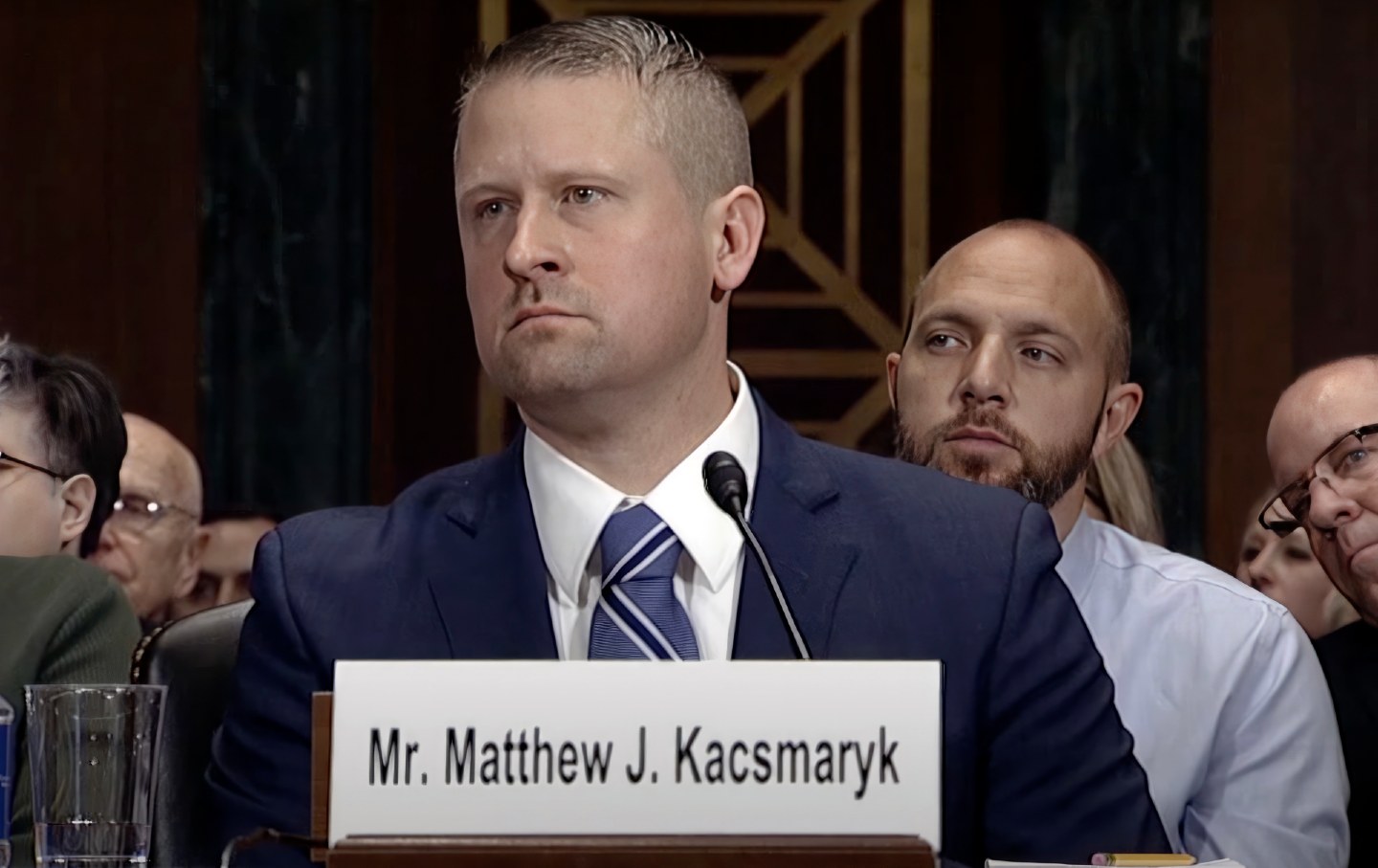A Texas Court Has Decided to Let the Scariest Judge in Texas Keep Being Scary
The Northern District of Texas has refused to adopt a policy reining in “judge shopping” and, with it, the power of “Mifepristone” Judge Matthew Kacsmaryk.

Matthew Kacsmaryk listens during his confirmation hearing before the Senate Judiciary Committee on Capitol Hill in Washington, on December 13, 2017.
(Senate Judiciary Committee via AP)If Democrats and good-faith Republicans want the members of the federal judiciary to behave like judges instead of weapons of mass destruction deployed by conservatives against women, people of color, the LGBTQ community, and the environment, they’ll need to pass legislation. Blue-ribbon committees, agency guidelines, congressional hearings, polite requests, and strongly worded letters are of no use. They have no impact on the extremist judges Donald Trump put in place, or the conservative judges emboldened by their example. Even legislation might not be enough, given that the Republican-controlled Supreme Court can and does simply overturn legislation it doesn’t like. But anything less than legislation is entirely pointless.
The latest evidence for this should-be-obvious fact comes from the Northern District of Texas. Late last week, the chief judge of that court rejected a rule made by the Judicial Conference. The Judicial Conference is a group of judges—including the chief justice of the Supreme Court, John Roberts, who serves as its presiding officer, and the chiefs of various courts of appeal, district courts, and some retired judges—that is supposed to make administrative rules for the entire federal judiciary. Last month, the conference made a rule aimed at stopping “judge shopping,” a practice that allows litigants to essentially pick their judge by filing lawsuits in certain districts. In most places, the practice is of limited value because, in most districts, judges are assigned to cases by random lot. But in Texas, judges are not assigned at random but on the basis of the courthouse where a case is filed.
In the Northern District of Texas, if a case is filed in Amarillo, litigants are sure to draw Judge Matthew Kacsmaryk. Kacsmaryk is a Trump-appointed Christian fundamentalist who acts like an inquisitor charged with bringing about the dominion of white men over everybody else, as he thinks God intended. He’s virulently anti-LGBTQ, despises reproductive rights, and is willing to embrace literally any crackpot legal theory that brings him his desired outcomes. Kacsmaryk is the person most responsible for the ongoing legal threat to the medical abortion pill mifepristone, as he is the judge who granted a group of doctors and dentists standing to challenge the Food and Drug Administration in a case they should have had no right to bring. The Supreme Court is currently deliberating that case.
Judges like Kacsmaryk put the conservative justices on the Supreme Court in a tight spot. Even though they’re all playing for the same bigoted and misogynist team and have the same conservative goals, what Kacsmaryk does cannot really be described as “law.” Kacsmaryk is like a guy who downloaded the Federalist Society generative AI platform on his phone, but doesn’t understand how to use it. He’s able to arrive at the approved conclusions, but the reasoning is garbled, which then forces the Supreme Court to try to preserve his rulings without fully accepting his risible and ridiculous reasoning.
To weaken his ability to embarrass the Supreme Court’s conservatives by constantly saying the quiet part out loud (and diminish the power of other litigants who use Texas district courts as chaos agents), the Judicial Conference’s new rule requires all districts, even Kacsmaryk’s, to make random assignments for all cases where the litigants seek a “nationwide injunction.” These are the big-ticket cases where the plaintiffs (which often include advocacy groups) are trying to get a single district court judge to stop a law (or ban a product) for the whole country. It’s a strategy used by both liberals and conservatives—conservatives use it to take away rights, and liberals, most recently, to stop or slow Trump’s policies—and it gives judges incredible power.
The Judicial Conference’s new rule would take away conservative groups’ ability to plant their cases before Kacsmaryk and instead make them draw from the entire pool of Northern District of Texas judges—a group that has plenty of conservatives but not all as ghoulish as Kacsmaryk.
It’s wise to view the Judicial Conference as John Roberts’s mouthpiece, and that’s especially true with this new rule. Roberts has written about the problems with judge-shopping in the past, and I’d argue that the stylings of Kacsmaryk bother him the most, because Roberts desperately wants to achieve what Kacsmaryk wants to achieve but through quieter, less legally belligerent means. Kacsmaryk, essentially, makes Roberts look bad and exposes his court as the grossly partisan institution that it is. I imagine Roberts views Kacsmaryk with the same disdain that a mob boss views an underling who goes out and buys a fur coat and a Cadillac the day after a major heist: Kacsmaryk exposes the whole operation because he can’t show a modicum of restraint.
However, despite the fact that this rule essentially came from the chief justice of the Supreme Court, the Northern District of Texas simply said “no.” David Godbey, Kacsmaryk’s boss and chief judge of the Northern District of Texas, replied to a letter from Senate majority leader Charles Schumer urging him to adopt the new rule with a letter of his own, which said: “The consensus [among the district’s judges] was not to make any change to our case assignment process at this time.” Translation: “Go to hell, Chuck” and probably “Remember the Alamo!”
Godbey can and will get away with this flat rejection of the new rule because the Judicial Conference’s administrative guidelines are simply that: guidelines. The Judicial Conference was set up by Congress in 1922 as an advisory board, one that makes recommendations about how the courts should operate but not one that actually has the authority to implement its recommendations. That power remains squarely with Congress.
Courts usually follow the guidelines, but they don’t have to. If we’ve learned anything about today’s ultraconservatives, it’s that they don’t respect the soft power of traditions and norms. Really, it’s only Democrats like Joe Manchin and Dick Durbin who are desperate to preserve norms; Republicans and conservative judges are interested purely in winning and reshaping the law in their curdled image.
As if to prove this point, the Northern District rejected the Judicial Conference guidance at the behest of Senate minority leader Mitch McConnell. McConnell told district courts to straight-up ignore the Judicial Conference, calling the new rule “half-baked guidance that does Washington Democrats’ bidding.” Again, this guidance is not coming from Washington Democrats so much as it is coming from the chief justice and, most likely, other conservative jurists who are sick of Kacsmaryk embarrassing them. But Kacsmaryk is useful to Republicans and other movement conservatives who want to reshape the country faster than Roberts will let them.
If “Washington Democrats” actually want to have a say in any of this, they need to pass a bill. Senator Mazie Hirono introduced one last year called the “Stop Judge Shopping Act” which would do through legislation exactly what the Judicial Conference attempted to do through guidance. But it went nowhere in the Senate. It didn’t even make it out of the Judiciary Committee (which Hirono is on).
Putting aside the Republican-controlled House for a second, I really can’t explain why the Democrats didn’t rally around it. I can’t explain why another bill Hirono cosponsored in 2021, the “Supreme Court Ethics Act,” also failed to make it out of the Judiciary Committee. I do not know why the president hasn’t put a number of these bills together and sold them as part of a larger court reform package. I don’t know why “You shouldn’t get to pick your own judge” isn’t a standard line in every Joe Biden stump speech while he runs for reelection. I, frankly, don’t know what the Democrats are doing or why they seem so content to just let the federal judiciary kick their asses every day and take their lunch money. I don’t know why these people we elected won’t fight back against the people nobody elected.
I do know that if you want to stop people like Kacsmaryk—a man who should be on a poster under the tagline “He’s coming for your contraceptives next!” in every Democratic attack ad in every state—you actually have to pass legislation. You have to rally public support behind the legislation and explain to the people why it’s needed. You have to try. You have to lead, or get the hell out of the way.
Disobey authoritarians, support The Nation
Over the past year you’ve read Nation writers like Elie Mystal, Kaveh Akbar, John Nichols, Joan Walsh, Bryce Covert, Dave Zirin, Jeet Heer, Michael T. Klare, Katha Pollitt, Amy Littlefield, Gregg Gonsalves, and Sasha Abramsky take on the Trump family’s corruption, set the record straight about Robert F. Kennedy Jr.’s catastrophic Make America Healthy Again movement, survey the fallout and human cost of the DOGE wrecking ball, anticipate the Supreme Court’s dangerous antidemocratic rulings, and amplify successful tactics of resistance on the streets and in Congress.
We publish these stories because when members of our communities are being abducted, household debt is climbing, and AI data centers are causing water and electricity shortages, we have a duty as journalists to do all we can to inform the public.
In 2026, our aim is to do more than ever before—but we need your support to make that happen.
Through December 31, a generous donor will match all donations up to $75,000. That means that your contribution will be doubled, dollar for dollar. If we hit the full match, we’ll be starting 2026 with $150,000 to invest in the stories that impact real people’s lives—the kinds of stories that billionaire-owned, corporate-backed outlets aren’t covering.
With your support, our team will publish major stories that the president and his allies won’t want you to read. We’ll cover the emerging military-tech industrial complex and matters of war, peace, and surveillance, as well as the affordability crisis, hunger, housing, healthcare, the environment, attacks on reproductive rights, and much more. At the same time, we’ll imagine alternatives to Trumpian rule and uplift efforts to create a better world, here and now.
While your gift has twice the impact, I’m asking you to support The Nation with a donation today. You’ll empower the journalists, editors, and fact-checkers best equipped to hold this authoritarian administration to account.
I hope you won’t miss this moment—donate to The Nation today.
Onward,
Katrina vanden Heuvel
Editor and publisher, The Nation
More from The Nation

In Memoriam: Beautiful Writers, Influential Editors, Committed Activists In Memoriam: Beautiful Writers, Influential Editors, Committed Activists
A tribute to Nation family we lost this year—from Jules Feiffer to Joshua Clover, Elizabeth Pochoda, Bill Moyers, and Peter and Cora Weiss

Brace Yourselves for Trump’s New Monroe Doctrine Brace Yourselves for Trump’s New Monroe Doctrine
Trump's latest exploits in Latin America are just the latest expression of a bloody ideological project to entrench US power and protect the profits of Western multinationals.


Blood Orange’s Sonic Experiments Blood Orange’s Sonic Experiments
Dev Hynes moves between grief and joy in Essex Honey, his most personal album yet.




